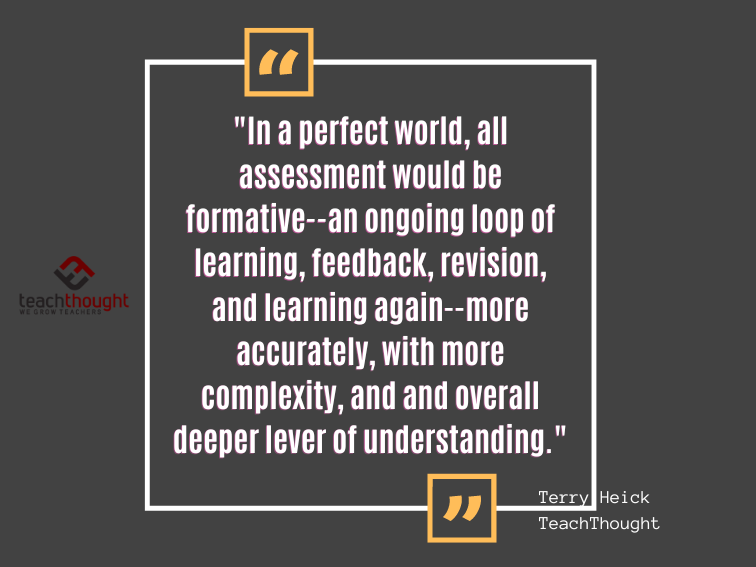
by Terry Heick
What is the purpose of assessment?
The purpose of assessment depends on a range of factors, of course. Broadly speaking, the purpose can be whatever the teacher wants it to be. Like pacing guides, apps, books, and more, an assessment is a tool a teacher uses to help students learn.
There are other forms (e.g., multiple-choice, performance-based, etc.) and types of assessment–benchmark, criterion-based, and norm-referenced assessments like the ACT and SAT, for example–whose purpose is often beyond the classroom. Many of these forms communicate to the families of students how that student compares to other students. These are usually age-based in K-12, so all third-graders can be compared. The utility of this form of assessment is fairly limited, useful primarily as a general ‘sense’ of how that student’s development compares to ‘what should be expected’–the expectation (or ‘standard’) being the performance of other children.
The trouble with these forms of assessment is not the assessment itself, nor the data it provides. The issue lies in how that data is misused or misunderstood–by administrators, teachers, parents, or even the students themselves. Assessments are snapshots based on a student’s readiness on a given day. Performance by the same student on the same content can vary from day to day. Further, some students simply ‘don’t test well’–due to test anxiety, for example.
See also 8 Common Sources Of Formative Assessment Data
Scores on assessments like these can have negative or positive effects on students, changing their self-image not only as a student but as a person, too. This obviously applies to school in general with ‘good grades’ and strong scores on tests leading students to believe they’re ‘smart’ and weaker performance in each area leading students to misunderstand the journey of being human–that development is uneven and sporadic at times. That school brings out the best in some minds while hiding the gifts of others. That the tendency to read and write and create and think critically is more important than the ability to.
With that context established, let’s narrow our discussion a bit to come up with a clearer sense of what an assessment is supposed to ‘do.’
The Purpose Of Testing
‘It depends’ prepends a lot of what I write because there are few universals in a system developed to help human beings grow. We’ve established that there are many types of assessment. Further, the learning objective also is a factor–what the teacher is helping students come to know or be able to do.
But at its essence, the purpose of assessment is to provide data to refine planned instruction.
See also 18 Inconvenient Truths About Assessment Of Learning
This is, of course, also the definition of formative assessment–assessment whose goal is to guide the ongoing planning and refinement of learning activities, projects, and more for students. Summative assessment is less about ‘refining planned instruction’ as it generally occurs at the end of a planned learning experience.
However, in a perfect world, all assessment would be formative–an ongoing loop of learning, feedback, revision, and learning again–more accurately, with more complexity, and an overall deeper level of understanding. It would inform students, teachers, and families what students truly understand and what they are able to do in terms of skills and competencies. In that perfect world, a letter grade of ‘F’ or a test score of 37%, for example, would lead to responses by a system of education (e.g., a teacher in a classroom) to remediate any deficiencies and illuminate a path forward for that student.
Assessment results should also actually reflect what a student understands–not just what they ‘know’ but how deeply they know it. And not just what they can do on a given day and test, but what they are truly capable of over time when they are at their best–their most authentic selves.
The purpose of any assessment so-designed should answer the question, “What now?”
See also Assessment Trends In Education: A Shift To Assessment For Learning